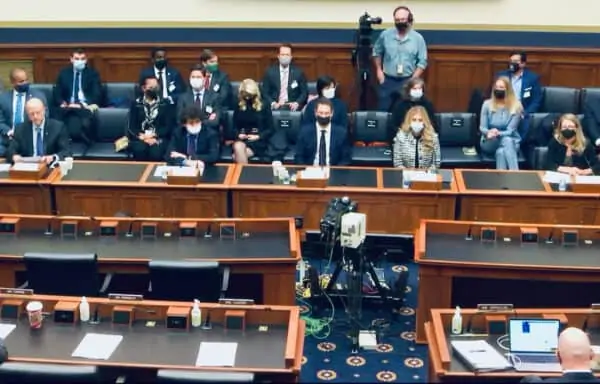Earlier today (December 8, 2021), the House Financial Services Committee held a hearing on digital assets. As was previously reported, the witnesses included top crypto executives and thus provided the opportunity for a unique discussion between House members and crypto entrepreneurs.
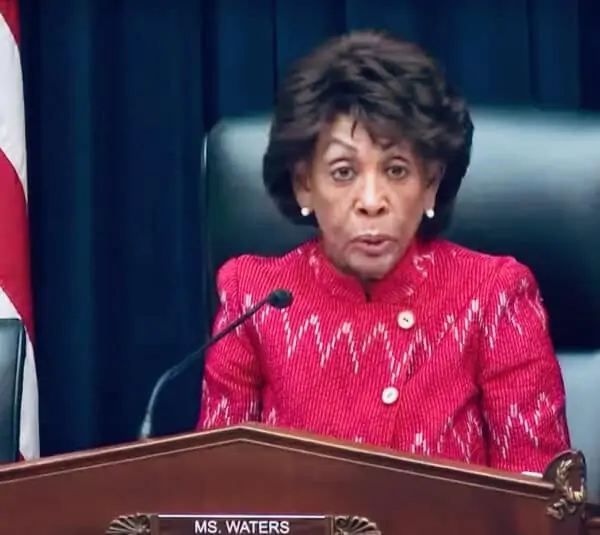 Chairwoman of the Committee, Representative Maxine Waters started her questioning with a critical question about Facebook/Meta and its Novi wallet, asking Paxos CEO Charles Cascarilla how Meta’s attempt to create a digital currency will not challenge the US dollar. Paxos said that Meta came to them because they have the most regulated product referencing its dollar-based stablecoin. Cascarilla noted that the pilot was quite limited in size (US and Guatemala) and suggested a discussion with Novi would reveal more information as to the company’s intent to expand the digital wallet.
Chairwoman of the Committee, Representative Maxine Waters started her questioning with a critical question about Facebook/Meta and its Novi wallet, asking Paxos CEO Charles Cascarilla how Meta’s attempt to create a digital currency will not challenge the US dollar. Paxos said that Meta came to them because they have the most regulated product referencing its dollar-based stablecoin. Cascarilla noted that the pilot was quite limited in size (US and Guatemala) and suggested a discussion with Novi would reveal more information as to the company’s intent to expand the digital wallet.
Ranking Republican Patrick McHenry used his time to focus on the need to enable Fintech innovation in the US instead of chasing crypto startups to other, more welcoming jurisdictions. “Policymakers need to understand the nature of Web 3,” said McHenry. Bitfury Group CEO Brian Brooks explained that Web 3 enables users the ability to own the network, and this is what crypto assets represent.
Regarding prepared remarks, Alesia Jeanne Haas, CEO of Coinbase Inc., and CFO, Coinbase Global Inc, said that crypto is opening up a new financial system. “[The] foundational benefit of crypto is that it allows for innovation of new financial and non-financial applications, like non-fungible art tokens (NFTs), that are controlled by the individual.”
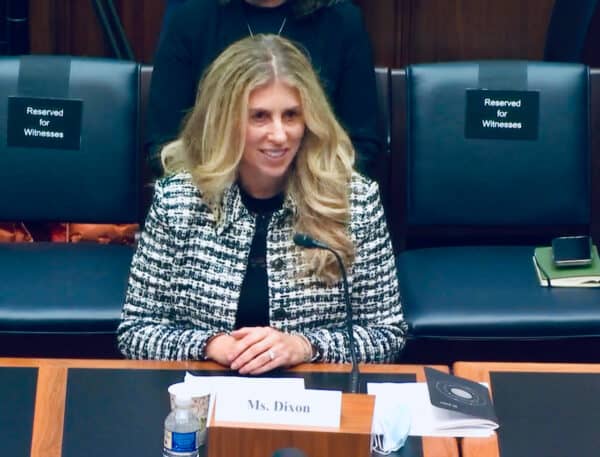 Denelle Dixon, CEO and Executive Director of the Stellar Development Foundation, explained that “Stellar is an open, permissionless, decentralized ledger, or blockchain network, that is optimized for payments.” Dixon said that Stellar has the ability to facilitate value transfers with “low transaction fees and high speeds.” This means that people who can least afford the cost of a transfer today, like underbanked individuals or immigrants, can now “keep remittance costs down, and ultimately make these payments more accessible to those who need it most.”
Denelle Dixon, CEO and Executive Director of the Stellar Development Foundation, explained that “Stellar is an open, permissionless, decentralized ledger, or blockchain network, that is optimized for payments.” Dixon said that Stellar has the ability to facilitate value transfers with “low transaction fees and high speeds.” This means that people who can least afford the cost of a transfer today, like underbanked individuals or immigrants, can now “keep remittance costs down, and ultimately make these payments more accessible to those who need it most.”
“Let’s not hamper innovation here in the United States which would have a real impact on the ability to make full use of this technology elsewhere. Let’s learn from the past, let’s take down the walled gardens, let’s get rid of the friction, and let’s create an open loop for innovation here in the U.S. We’ve seen firsthand the challenges when we leave access to innovation in the hands of a few; consider the existing banking infrastructure that relies on technology decisions made decades ago. Open networks, like Stellar, allow for continuous innovation, making sure our systems are more interoperable and adaptable. Financial inclusion, innovation, and integrity are not trade-offs,” stated Dixon.
Cascarilla said our current financial system is inadequate:
“At any given time, there are trillions of dollars’ worth of capital held up in transactions that have not yet settled. Remittance recipients and other payees don’t have access to their funds. Money that could help others or be productively deployed is unnecessarily trapped in limbo. Whole industries have developed to take advantage of these delays, often to the detriment of those who can least afford it. How many overdraft fees could have been avoided if people received their money immediately after it was sent?”
Noting that the financial system has failed many groups and remains expensive, Cascarille sees blockchain as the “path forward” offering a far better alternative.
Brooks, who was recently the acting Comptroller of the Currency and well-versed in these hearings, told the Committee that it is better to bring crypto into the regulated system, instead of outside of reasonable compliance.
“There are a number of examples of U.S. regulatory decisions that have driven legitimate activity offshore, in ways that harm U.S. investors, innovators, and workers. Can anyone explain, for example, why Fidelity Investments, one of America’s best- known investment advisors, had to go to Canada to offer a Bitcoin ETF? Or why physically settled crypto ETFs are safe and legal in Germany, Brazil, and Singapore, but not in the United States? Can anyone explain why crypto exchanges, stablecoin issuers and others can receive e-money licenses to access the payments system in the United Kingdom, but in the United States that privilege is reserved exclusively for chartered banks, with the result that the GDP cost of the payments system in the U.S. is roughly four times the cost in the U.K.?”
Jeremy Allaire, CEO and founder of Circle, expressed his opinion that we are at a pivotal point in the transition of the internet. He said:
“The impact of this development on the future of U.S. economic competitiveness cannot be overstated. Indeed, just as the internet of the past two decades imported liberal western ideals of openness, free market competition and decentralization, this new economic infrastructure layer of the internet should similarly enshrine our principles.”
Allaire also took the opportunity to tout the USDC stablecoin and the fact that it is backed by dollar-denominated reserves and held “conservatively” in custody within the US banking system.
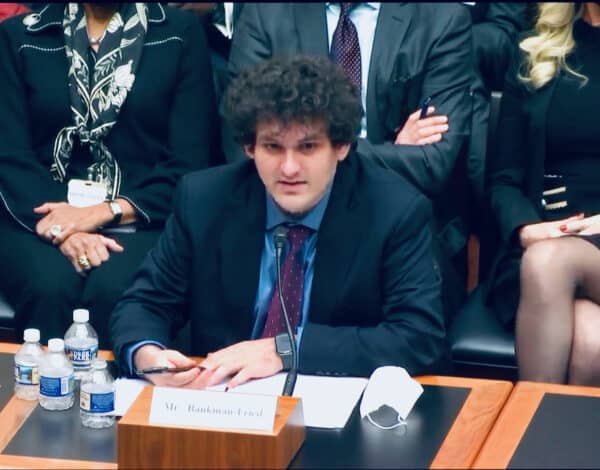 Sam Bankman-Fried, co-founder and CEO of FTX, one of the top crypto exchanges in the world, shared that FTX is designed to empower the individual investor and consumer:
Sam Bankman-Fried, co-founder and CEO of FTX, one of the top crypto exchanges in the world, shared that FTX is designed to empower the individual investor and consumer:
“…because we offer products that are easily accessible and inexpensive, so investors and consumers can make simplified choices to achieve their economic goals. Easy access to financial products all in one place, in many cases on a mobile phone, without multiple gatekeepers assessing rents and posing risks to the investor along the way, is how the digital asset ecosystem is impacting the real everyday lives of those involved, and helping them achieve economic security along the journey.”
He said that a supportive and accommodating policy environment will “only empower the individual investor even further.” Bankman-Fried added that he fully supports a regulatory framework that protects investors and ensures an orderly market to “maintain US leadership.”
For most of the hearing, many members were supportive of digital assets in general, with many advocating for clear-cut rules that do not exist today.
The platforms shared how they currently adhere to strict AML/KYC rules while working closely with authorities to uncover or halt any nefarious activity. Blockchain is a public ledger making it easy to trace transactions that may be illicit in nature – unlike cash.
Brooks said that the US needs to compete on features and utility, globally.
Allaire noted that stablecoins backed by US Treasuries are safer than dollars in a bank account as they are fractional reserves. He sees the support of dollar-based, regulated stablecoins as supporting the US dollar as the reserve currency of choice. Allaire said that today, the US is “winning the digital currency battle” adding that most innovations in payments have been driven by the private sector.
Bankman-Fried highlighted the fragmented regulatory environment as well as the many international licensees (170 different jurisdictions) his crypto exchange has received. “We just submitted an 800-page proposal to [the CFTC] we are excited to discuss,” he shared. FTX does not trade securities, but they would be excited to do so.
Cascarilla highlighted the efficiency of digital asset transfers as they are open 24/7 with value sent for less than a penny (in comparison to costly card etc. payments).
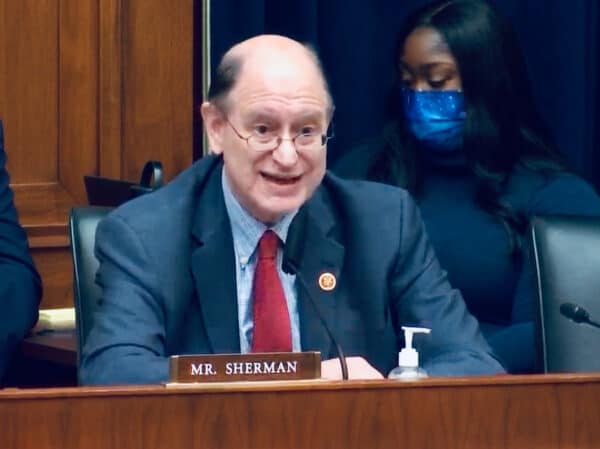 The one member that was extremely critical of crypto (consistently so), was Representative Brad Sherman of California. Sherman slammed crypto as being “hip” and an “attack on the powers of society.” Sherman added that crypto is controlled by the “powers of society” like Goldman Sachs, JPMorgan, Musk, and Zuckerberg. “The number one threat to crypto is crypto,” said Sherman. Chairwoman Waters gavelled Sherman’s rant and cut his questioning short.
The one member that was extremely critical of crypto (consistently so), was Representative Brad Sherman of California. Sherman slammed crypto as being “hip” and an “attack on the powers of society.” Sherman added that crypto is controlled by the “powers of society” like Goldman Sachs, JPMorgan, Musk, and Zuckerberg. “The number one threat to crypto is crypto,” said Sherman. Chairwoman Waters gavelled Sherman’s rant and cut his questioning short.
Sherman appeared to indicate that a future hearing on digital assets, one that involves critical academicians, may be forthcoming.
Later during the hearing, Representative Anthony Gonzalez threw shade at Sherman saying he should be ignored.
Representative Jake Auchincloss, a Democrat, indicated an interest to work across party lines to empower a primary crypto regulator and to help the digital asset market grow and evolve.
Nearing the end of the hearing, Bankman-Fried said the key to maintaining dollar supremacy around the world is by promoting dollar-based stablecoins while enforcing strict regulation and validating reserves. He advocated for daily attestations and third-party audits to ensure stablecoins are fully backed. This could be the most important thing Congress can do to maintain innovation and support crypto assets. All the witnesses appeared to agree with this approach. Auchincloss said this presents a clear step forward for Congress to pursue and may emerge as an opportunity for some near-term bi-partisan legislation.
Having a clear regulatory approach, with a single unified framework and regulator, is something that all witnesses believe is vital to support sector growth. That, and a Self Regulatory Organization (SRO), should take the industry to the next level while improving the US’s competitive position in global digital asset innovation.
The video of the hearing is available below.


